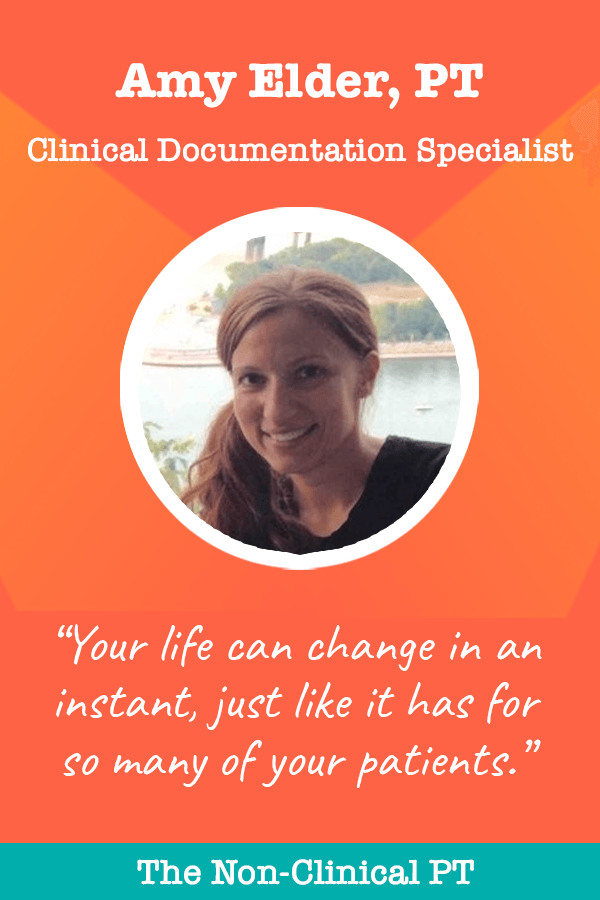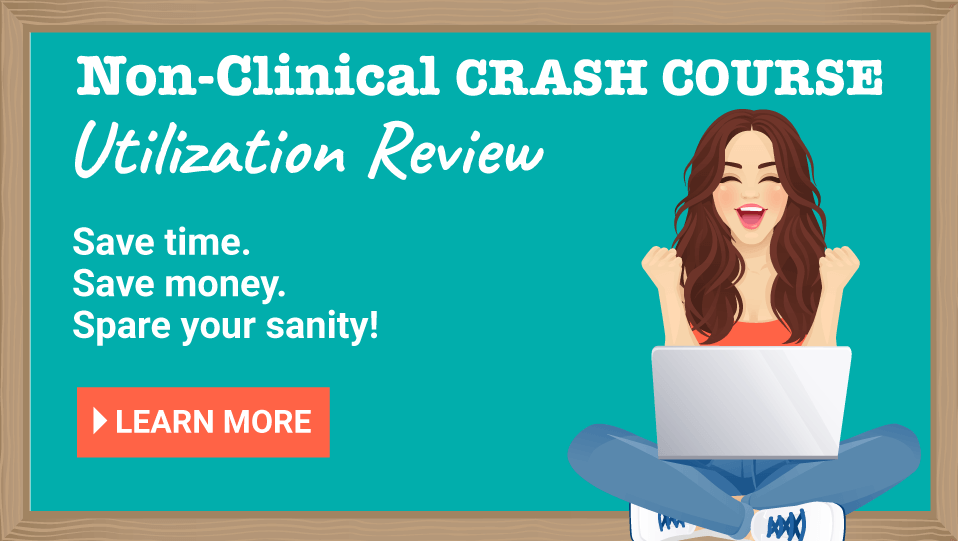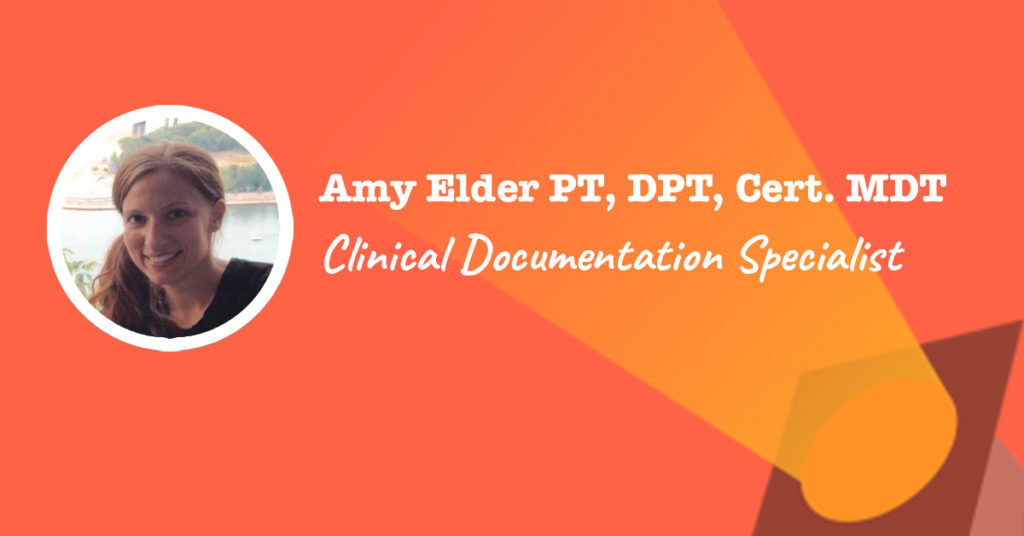This week’s spotlight features Amy Elder, a physical therapist whose life was turned upside down by an illness—but whose career took a cool non-clinical path as a result!
This post may contain affiliate links or codes. This won’t increase your cost, but it helps keep TNCPT alive, and free of annoying ads! Thank you for your support. 🙂
What is your full name and title at your current job?
Amy Elder PT, DPT, Cert. MDT
Clinical Documentation Specialist at PHOENIX Rehabilitation and Health Services

I’m also a freelance health content writer, which I discuss more later in this spotlight 🙂
Where did you go to PT school, and what year did you graduate?
I went to PT school at Arcadia University and graduated in 2007.
What did you do when you first finished school, and for how long?
When I graduated, I went straight into outpatient orthopedics working for a small private practice. (It was small then; it’s huge nowI!) I treated all orthopedic injuries and became McKenzie certified. I did that for 4 years.
What did you enjoy about patient care? What didn’t you enjoy?
I loved the camaraderie with patients, and I loved when I would make someone feel better. I also loved figuring out a complicated case.
I didn’t love what we all don’t love: the documentation after the fact—which makes my current role completely ironic!
At what point did you realize you wanted to do something non-clinical with your background, and why?
Well, here is where my story will be quite different than others featured in this spotlight. I didn’t choose to do something non-clinical; it was chosen for me. Eight years ago, I became severely ill, which rendered me unable to function as a practicing PT any longer.
Wow…did you immediately go non-clinical?
No, I initially took a few years where I didn’t work at all. I was only focusing on my recovery and being a patient of PT, OT, and speech myself (all three!). But, after that, I felt it was time to work again.
How were you able to re-enter the workforce?
After I got sick, I had kept in contact with my wonderful boss, who is now the COO of the company. We met a few times for lunch, and he told me that our company had a need for this internal review role and he offered it to me. So, I became the Clinical Documentation Specialist for my company.
What does being a Clinical Documentation Specialist entail?
I review charts. OK, that’s the short version of what I do!
More specifically, I look for Medicare requirements such as signed POCs, appropriate measurements, documentation of medical necessity, etc. I also maintain an internal “compliance blog” for the company.

Are you still treating patients, or are you solely non-clinical?
I’m solely non-clinical.
How long have you been in your current role?
I’ve been in this role for about six years.
How did you find your job? Did you apply or find it through a connection?
I didn’t find it; it found me. 😊
Did you do anything special to your resume and cover letter to land the job?
No—since it was a position that was needed at my company and I happened to be the right person for the job, given my situation, things just worked out for me.
Did you get any special certifications or training along the way to help you get into your current role?
No, I haven’t. Right now, I’m just using my clinical knowledge to do my job and learning documentation requirements of Medicare. I’m considering pursuing some certifications in this area.
How have people reacted to you leaving patient care?
Well…this is a hard question to answer since I left patient care due to health issues, not by choice.
What’s a typical day or week in the life like for you?
I work from home, on my computer. I don’t have any set hours that I need to be available. I have extreme flexibility.
What are some of the challenges of your role? What are the rewards?
The rewards of this role have been unexpected. When I started this, I realized just how badly it was needed. For the most part, therapists don’t seem to be very good communicators…on paper, that is.
Many therapists do a fantastic job of documenting their treatments. But, some of the documentation that I was reading that was being sent to other medical professionals to read was…in serious need of improvement. 😊 It has been rewarding to see this improve greatly in my company.
Some people have been very grateful to me for helping to explain how to better document and communicate—others, not so much. Therein lies the challenges: when I review a chart and a therapist gets defensive about some of the constructive criticism that I give.
How do you think working as a PT prepared you for this role? Which skills transferred?
It’s hard to say. Obviously, being a therapist allows me to understand all the lingo on charts. But the documentation and communicating aspect of it was not necessarily helped by being a formerly practicing PT. Well, come to think of it, I guess it did. I know what needs to be said and how it should be said!
Roughly speaking, how are the hours and pay compared to patient care?
The pay is pretty similar, or maybe a bit higher. The hours and flexibility are a whole lot different since I work from home.
What type of person do you think would do well in your role?
Someone who enjoys working alone. I’m an introvert by nature, so this role really suits me well. If you’re an extrovert and need to be around people all the time, this role is not for you.
Do you work remotely or on-site?
Remotely

Does your organization hire PT, OT, or SLP professionals into non-clinical roles?
Not very often. But any job openings would be listed on www.phoenixrehab.com
Did you read any books, take any courses, or do anything special overall to get you where you are today?
Nope! The only thing I did was get sick. 😊 I now read a lot of Medicare educational stuff.
What is a typical career path for someone in your role?
You would need to have a few years in the clinical setting under your belt to do this; it couldn’t be done right out of school.
What is next for you? What do you want to do with your career long-term?
Very good question and I don’t know the answer to this. I never, in a million years, thought that I would leave patient care. Long-term, I really don’t know. I get to choose what’s next, and I didn’t really choose this. I do know that I’m very interested in writing and TelePT.
Oooh…you know writing always gets me excited! Do tell!
I recently completed a continuing education course about strokes for PTcourses.com. It has been approved for six contact hours in nearly all 50 states. I am currently working on a second course with them, with the plan to do more after that.
I’ve also recently begun to do some copywriting for the company LeadClickz. And, I’m extremely excited for my latest opportunity, which is writing clinical articles for the startup ROMBOT.com.
What would you recommend to someone who is considering going into a role like yours?
I would recommend being very diligent with documentation and communication from the start of your career; it will be noticed by someone.
Here are some words of wisdom:
Your life can change in an instant, just like it has for so many of your patients. It can happen to you, too. Nobody is immune. I was completely devastated when I got sick and, for a long time, thought that all that money I spent on school, all those years I invested in work were wasted and that I would never be able to use my skills and knowledge again. That wasn’t the case.
What would you like to change most in your profession, and why?
I’d like to change how strict external auditors can be of charts when they are reviewing documentation about a patient who they know nothing about from a therapist who they know nothing about. It can be a real downer.
That said, on the whole, I feel that therapists need to do their part in documenting/communicating much better—so we need to meet in the middle somewhere.
If you could give yourself one piece of career advice you wish you had during PT school, what would it be?
A wonderful therapist at my company said this to me—she said she always tells her students to document exactly what you are thinking, always let them know what’s going on in your head.
Do you have any special advice for other clinicians who want to follow in your footsteps?
If you feel you have writing skills, and you think you could help others to better communicate, ask for a role like this in your company; it is so vital and needed!
Thanks for your insight, Amy!





